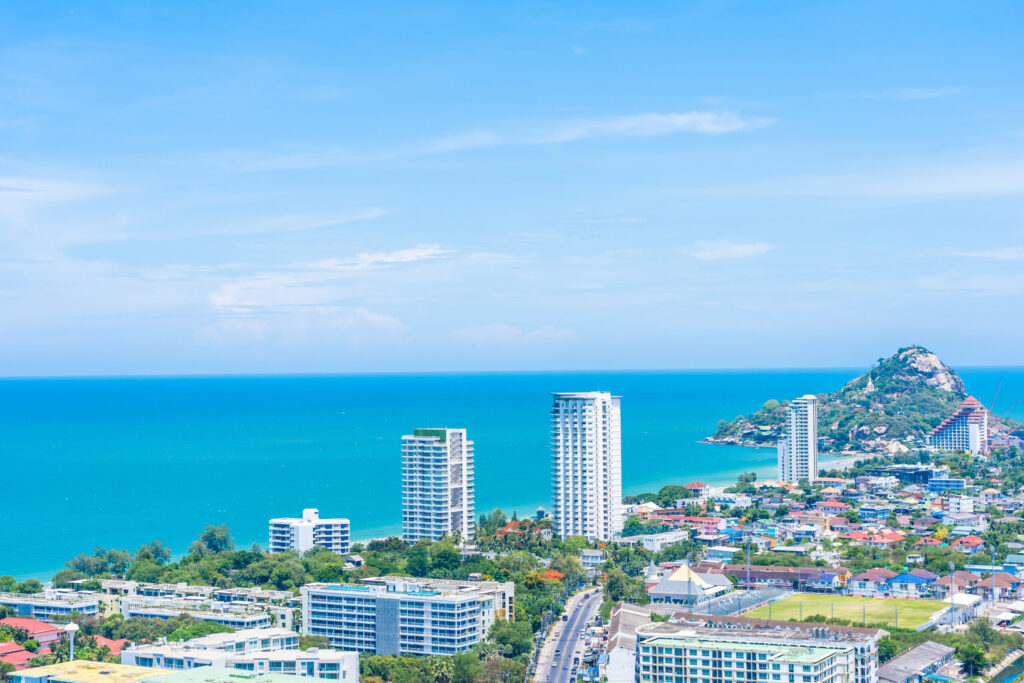Learn English in Thailand – Hua Hin, a Sustainable Place to Stay
Learn English in Thailand, speficially, Hua Hin. The beach side town is fast becoming one of the most distinctive coastal destinations in Southeast Asia, offering the perfect mix of culture, beach life, and educational opportunity. For international students who want to learn English in Thailand, Hua Hin provides not just sunshine and safety but also a healthy environment where clean air, community, and learning come together.
This reputation was reinforced in September 2025 when Hua Hin Municipality received one of the region’s highest environmental honours — the ASEAN Environmentally Sustainable Cities Award for Clean Air. The recognition confirms what students and group leaders at Dragon Study Tours already experience daily: Hua Hin is a place where you can study, explore, and breathe easy.
Learn English in Thailand – What is ASEAN and Why Does This Award Matter?
ASEAN stands for the Association of Southeast Asian Nations, a regional organisation that brings together ten member countries — including Thailand, Malaysia, Singapore, Vietnam, and Indonesia — to promote cooperation and shared development across the region. Within ASEAN, one of the key goals is sustainability: to encourage cities to adopt long-term policies that balance economic progress with care for the environment.
The ASEAN Environmentally Sustainable Cities (ESC) Award is presented every three years to recognise towns and cities that excel in environmental management. Awards are given for clean air, clean land, and clean water. The aim is to highlight examples of best practice and inspire other municipalities across Southeast Asia to follow similar paths. Hua Hin’s award in the Clean Air category was the result of detailed assessments carried out by the ASEAN Working Group on Environmentally Sustainable Cities. The full background to this initiative can be found on the ASEAN official website.
Learn English in Thailand: Why Hua Hin Was Recognised for Clean Air
Hua Hin stood out because of its consistent and community-driven approach to keeping the city’s air quality high. The municipality has implemented tree-planting schemes, promoted the use of clean energy in public transport, and introduced better waste management systems. It has also run educational campaigns to raise awareness among residents and tourists about how individual actions can make a difference.
The result is a cleaner, greener city that sets an example for others. According to Thailand’s Department of Climate Change and Environment, Hua Hin’s air-quality index has remained at healthy levels throughout the year, even during periods when pollution has affected other regions of the country. This achievement strengthens Hua Hin’s image as a forward-thinking community and supports Thailand’s wider efforts to meet the United Nations Sustainable Development Goals.
How the Award Connects to Dragon Study Tours
For Dragon Study Tours, the ASEAN award represents more than civic pride; it reinforces the quality of life our students experience while studying here. When young people travel to learn English in Thailand, they need a setting that feels safe, healthy, and inspiring. Hua Hin delivers all three. The town’s clean air, calm streets, and coastal surroundings provide the perfect environment for focused learning and relaxed exploration.
Every Dragon Study Tours programme combines classroom English lessons with real-world experiences through our afternoon social programme. These activities make use of Hua Hin’s natural beauty and cultural highlights. The ASEAN award allows us to build even more meaningful experiences around environmental awareness, sustainability, and outdoor discovery. Students might take part in a guided nature walk, visit a local park that contributes to the city’s green efforts, or join a community clean-up project. These activities strengthen communication skills while helping students connect with local people and the environment — a true reflection of what it means to learn English in Thailand.
Our Afternoon Social Programme
The Dragon Study Tours afternoon social programme gives students the chance to practise their English in natural situations beyond the classroom. Lessons in the morning focus on listening, speaking, and pronunciation, while afternoons bring Hua Hin to life through a carefully planned mix of adventure, culture, and social engagement.
Thanks to Hua Hin’s recognition for clean air, several of our activities now highlight environmental appreciation. Students can explore protected beaches, cycle along scenic coastal routes, or visit farms that promote sustainable practices. These excursions are not just sightseeing; they are opportunities for discussion, teamwork, and cultural exchange — all conducted in English.
Many of our excursions are drawn from our official guide, 50 Things to Do in Hua Hin, a collection of local experiences curated by our team to showcase the very best of the region. From visiting temples and night markets to exploring mangrove forests and waterfalls, the list helps groups design their perfect balance of learning and discovery. The ASEAN award gives even more value to these activities, showing that Hua Hin’s commitment to clean air enhances every moment spent outdoors.
Why Clean Air Supports Better Learning
Air quality affects focus, concentration, and overall well-being. For students spending several weeks in Hua Hin, studying and living in a clean-air environment supports their ability to stay alert and positive throughout the day. Breathing cleaner air means sleeping better, learning more effectively, and enjoying outdoor lessons without discomfort. It also reflects the shared values of Dragon Study Tours: respect for the environment, community engagement, and continuous improvement.
Hua Hin’s environmental achievement is not just a local success but also a sign of regional progress. Across Southeast Asia, cities are beginning to take similar steps to protect air quality and promote sustainable urban life. More information about Thailand’s national environmental policies can be found through the Tourism Authority of Thailand and regional news coverage at Hua Hin Today.
A Perfect Balance of Learning and Lifestyle
Students who join Dragon Study Tours discover that Hua Hin offers far more than classrooms and beaches. It provides a way to learn English in Thailand that feels connected to both people and place. Morning lessons help build language confidence, and afternoons immerse students in the city’s culture, nature, and history. The recent ASEAN award confirms that these experiences take place in an environment that values sustainability and quality of life.
Dragon Study Tours will continue to build on Hua Hin’s environmental success by incorporating more community-based and eco-friendly activities in future programmes. Each group that visits contributes not only to local learning but also to a wider understanding of how education and sustainability can work together.
Hua Hin’s ASEAN award for clean air proves that a city can be both a tourism destination and a model of sustainability. For Dragon Study Tours, it strengthens the town’s position as the best place to learn English in Thailand — a safe, vibrant, and environmentally responsible setting for young learners from around the world. Whether students are exploring cultural landmarks, enjoying the beach, or participating in one of our afternoon activities from our 50 Things to Do in Hua Hin list, they are part of a community that celebrates learning, friendship, and a cleaner future for everyone.



